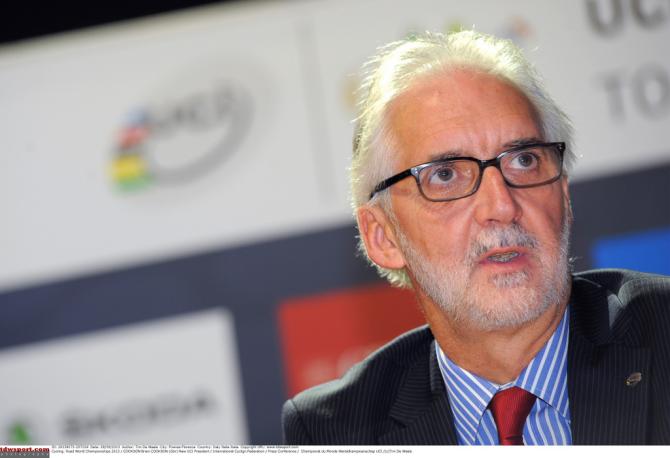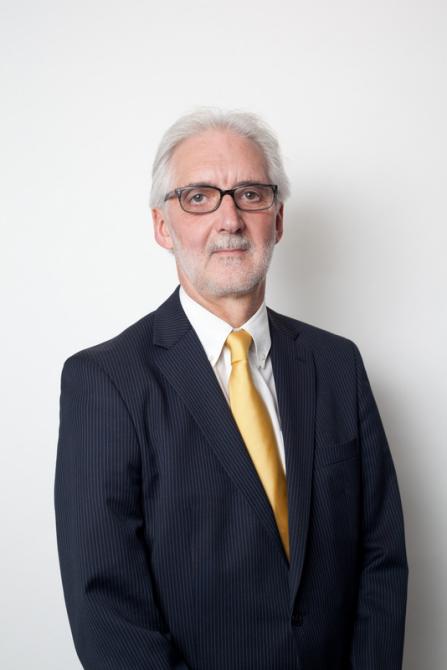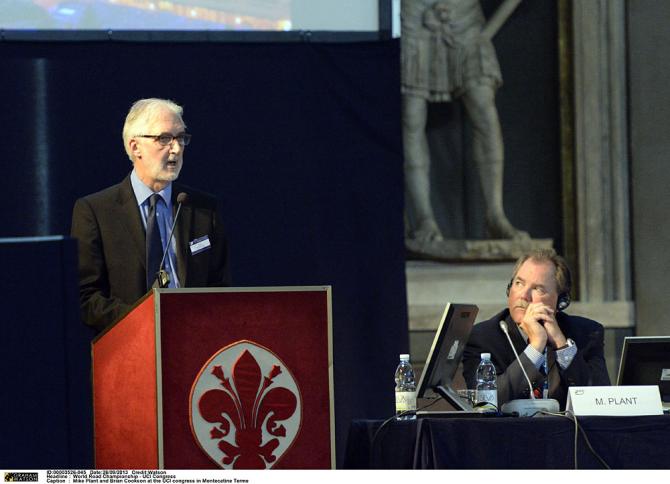Cookson insists WorldTour reforms will be in place for 2017
Still no agreement between UCI, teams and race organisers




UCI President Brian Cookson has insisted that the wide-sweeping reforms of professional road racing that will revolutionise the sport in 2017 are on schedule despite a breakdown in negotiations with key stakeholders during the summer and a further stall at the recent road world championship in Ponferrada.
Cyclingnews understands that the UCI is keen to push through the reforms this winter, perhaps in time to present them at the planned UCI WorldTour Forum in December, despite doubts about how the new structure will work in the long term and what it means for the future of the sport.
The UCI hopes the reforms will make professional cycling more attractive to sponsors and more sustainable for teams and race organisers. However some of the stakeholders involved in the talks feel the current proposals are unworkable and have pushed back at the UCI's desire to control the decision-making process.
The Cyclistes Professionnels Associés - the riders' union - is against a reduction in the number of riders in WorldTour teams, fearing this will leave some riders without a contract in the future. Vuelta director Javier Guillén hit back at the idea of cutting the Spanish Grand Tour, while the AIGCP - the teams' association - also have doubts about the current structure of the reforms.
Brian Cookson took over the reform process from previous UCI President Pat McQuaid last September and has since replaced many of the key managers at the UCI. Talks and debate have been going on for several years with no sign of a final agreement. Yet Cookson is convinced the reforms will be finalised in the coming months, so that teams and race organisers can begin to plan and prepare for 2017. For example, points scored in 2015 and 2016 could influence which teams have a place in the new-look WorldTour in 2017. Team sizes and specific rules also influence sponsorship investments and rider earnings. Nobody knows how professional cycling will be structured beyond 2016.
“Sometimes you reach a stage where proposals have to be looked at and changed, debated and discussed. We're still in that formative stage. I think it is important that everyone buys into what we come up with at the end of the day and has ownership of it, because some changes will be required,” Cookson told Cyclingnews recently, refusing to go into detail.
“I don't want to comment on any one issue. There's a lot of debate and discussion on a lot of issues, not least on the number of days in a Grand Tour and others. It's right and proper that any of the stakeholders express their opinions and were still in that phase.”
Get The Leadout Newsletter
The latest race content, interviews, features, reviews and expert buying guides, direct to your inbox!
Cookson refused to reveal any kind of deadline to reach an agreement.
“I also don't want to give any specific day as a key date because then you guys in the media will be knocking on the door asking what happened. I'm not going to be a hostage to fortune in that way,” he said.
“We're still discussing a number of things. At the end of the day it's important we create a system and structure that is comprehensible to everybody, that the fans and the media can understand and that allows the teams, race organisers, sponsors and national federations to be able to have a strong economic structure for the future.”
The planned reforms
Details of the proposed reforms to professional cycling have never been formally published or presented to the media and cycling fans. However leaks have shown the changes could be dramatic.
The aim is to modernise professional cycling by shaking up the race calendar and team structures. A new WorldTour calendar has been hypothesized, with two races never held at the same time, the Vuelta could be cut from three weeks to just two and other races will be cut or even removed from the current WorldTour calendar.
The number and size of the WorldTour teams is also expected to change. The most recent proposal suggested 16 "A" WorldTour teams of 22 riders, with a second division of eight "B" teams and a system of promotion and relegation in place. The eight "B" teams would be like the current Professional Continental teams that fight for Wild Card invitations to the major races. They would be guaranteed 50 days of racing in the new WorldTour system. All 24 teams would have to run a development team but not a women's team.
A salary cap could also be part of the reform to create more financial equality between the teams. Some teams, backed by wealthy individuals or state-controlled sponsors seem to have virtually unlimited budgets, while others are limited by commercial returns of sponsors and short-term contracts.
Rider safety is also a key with improvement in course designs and a clear protocol for extreme weather conditions to protect the riders. This would hopefully avoid the situation that occurred at this year's Giro d'Italia, when confusion reigned at the snow-covered summit of the Passo dello Stelvio.
Riders would also race less to protect their health but hopefully face their biggest rivals more often. The reforms could allow team leader to compete in all three Grand Tour, as Tinkoff-Saxo has recently proposed.
No consultation with fans
Apart from an online survey of fans' thoughts and opinions held in early 2013, the UCI has not engaged with fans to discuss the reforms or their consequences. Cookson insists he listens to the fans via social media and is active on Twitter but he is against involving the fans in the decision-making process.
“I don't think we can ever not pick up the opinions of the fans and the public. We pick them all the time via the media, the internet and things like Twitter. People certainly let me know what they think via social media,” Cookson told Cyclingnews.
“At the end of the day, the UCI is a representational body and is owned by the federations. Perhaps it's a little archaic in the way its democratic structure operates but if you're a member of a national federation, you have a voice. I urge people to join their national federations around the world rather than send angry tweets.
“We have the final word because we are the international governing body for the sport. We're trying to bring everyone together in a way that works for everyone and gives everyone a sustainable future.”

Stephen is one of the most experienced member of the Cyclingnews team, having reported on professional cycling since 1994. He has been Head of News at Cyclingnews since 2022, before which he held the position of European editor since 2012 and previously worked for Reuters, Shift Active Media, and CyclingWeekly, among other publications.